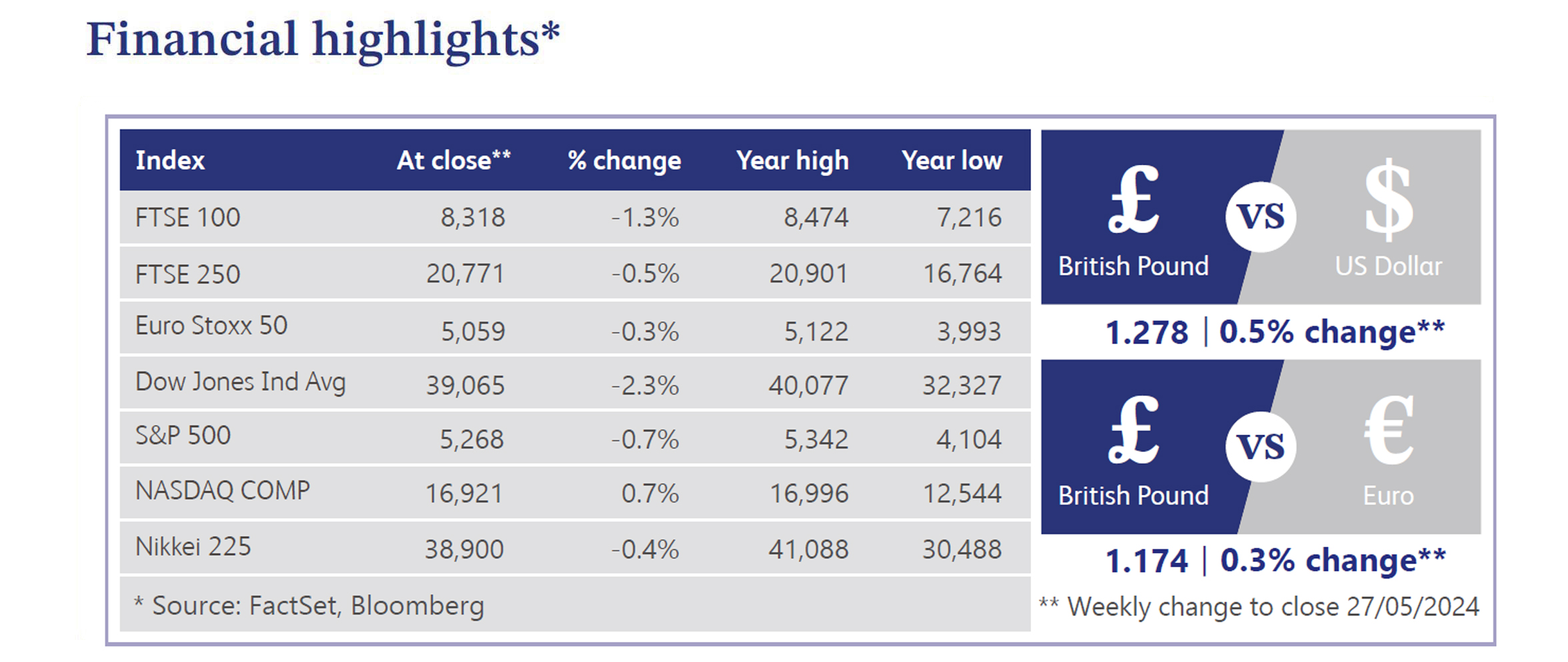
28 May 2024
UK inflation eased sharply in April to 2.3% year-on-year, surpassing market consensus and Bank of England (“BOE”) forecasts of 2.1%, marking the lowest rate since summer 2021. While gas and electricity prices declined, motor fuel prices increased, slightly offsetting the downward pressure. However, core inflation remained sticky, recording a 3.9% figure against a consensus of 3.6%. The key services measure, closely monitored by the BOE for second-round effects, eased slightly to 5.9% from 6.0%, still above the 5.5% consensus.
UK grocery inflation fell for the fifteenth consecutive month in May to 2.4%, the lowest since October 2021. Despite this, wage growth increased to 4.9% for the three months to April. BOE's chief economist, Huw Pill, indicated that wage growth in the 3-4% range aligns with a 2% inflation target. Following the inflation update, the likelihood of a June rate cut dropped to below 20%, with market expectations shifting to November. This shift coincided with a rise in UK gilt yields, with two-year yields climbing over 0.15% to just under 4.50%, and ten-year yields up about 0.10% to around 4.25%.
US equities ended the week higher, with the Nasdaq locking in its fifth consecutive week of gains, and the S&P 500 narrowly securing its fifth straight weekly rise. Big tech, semiconductors, auto parts, retail, banks, credit cards, homebuilders, travel/leisure and building products outperformed; while software, managed care, pharmaceuticals, biotech, airlines and grocers lagged. Treasuries were mixed, with a flattening yield curve, and the dollar index was down 0.4%. Gold finished down 0.1%, while Bitcoin futures rose 3.1%.
The market bounce in the US was supported by rate stabilisation, big tech and momentum outperformance, positive data and retail earnings. Despite Federal Reserve pivot expectations, there were signs of a firmer growth backdrop. Nvidia's positive earnings report as well as Microsoft's positive takeaways from its Build conference, added to the positive sentiment. Meanwhile, results from the University of Michigan’s Survey of Consumers, published in May, showed improved consumer sentiment, though near-term inflation expectations ticked up slightly.
UK financial services investment saw a boost, with the UK extending its lead as Europe's top destination in spite of Brexit. The UK attracted 108 financial services projects in 2023, up from 76 in 2022. Investors are increasingly optimistic on UK equity markets, with the FTSE 100 hitting new record highs and outperforming Europe and the US. Positive sentiment is driven by increased takeover activity, a better macro picture and expectations of rising buybacks and initial public offering activity.
The UK election announcement has lifted some uncertainty, allowing investors to focus on the interest rate outlook and economic conditions. Despite limited policy options, both major parties have committed to reducing debt. Labour aims to boost the economy through private investment, while the Conservatives have focused on economic improvement under Rishi Sunak's leadership.

National Grid, the British multinational electricity and gas utility company, saw its share price decline by approximately 14.8% last week as the company announced its full year results. The company announced that profit before tax decreased by approximately 16.6% to £3 billion, compared to last year's £3.6 billion figure. Earnings per share declined by approximately 19% to 60 pence per share, compared to 74.2 pence per share in the previous year. The company also announced a £60 billion investment over the next five years, which is nearly double the previous five-year period.
RS Group, the distributor of industrial and electrical products, witnessed a share price decline of approximately 10.2% last week after it reported its full year results. The company announced a profit before tax figure of £249 million, a 33% decline compared to last year’s figure of £372 million. Cash generated from operations also declined by 27% to £301 million. The management team announced that demand is stabilising, but remains subdued, with limited short term visibility.
Marks & Spencer, the UK retailer, announced its full year results last week, which saw its share price close the week approximately 8.1% higher. The company reported profit before tax of £673 million, an increase of 41% from last year’s £476 million figure. Adjusted basic earnings per share also saw a strong increase of approximately 46% to 24.6 pence compared to last year's figure of 16.9 pence. The results showed strong performance for the year, beating analyst expectations for the period. This has led analysts to upgrade forecasts with positive momentum alongside an acceleration in both capital expenditure and operational expenditure to drive further growth.

Market Commentary prepared by Walker Crips Investment Management Limited.
This publication is intended to be Walker Crips Investment Management’s own commentary on markets. It is not investment research and should not be construed as an offer or solicitation to buy, sell or trade in any of the investments, sectors or asset classes mentioned. The value of any investment and the income arising from it is not guaranteed and can fall as well as rise, so that you may not get back the amount you originally invested. Past performance is not a reliable indicator of future results. Movements in exchange rates can have an adverse effect on the value, price or income of any non-sterling denominated investment. Nothing in this document constitutes advice to undertake a transaction, and if you require professional advice you should contact your financial adviser or your usual contact at Walker Crips. Walker Crips Investment Management Limited is authorised and regulated by the Financial Conduct Authority (FRN:226344) and is a member of the London Stock Exchange. Registered office: Old Change House, 128 Queen Victoria Street, London, EC4V 4BJ. Registered in England and Wales number 4774117.
Important Note
No news or research content is a recommendation to deal. It is important to remember that the value of investments and the income from them can go down as well as up, so you could get back less than you invest. If you have any doubts about the suitability of any investment for your circumstances, you should contact your financial advisor.